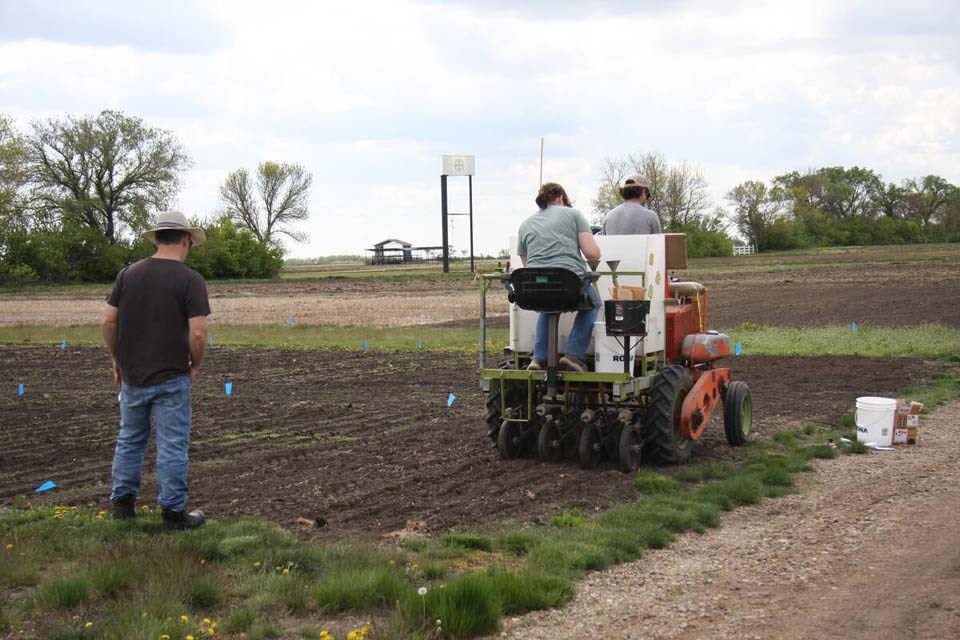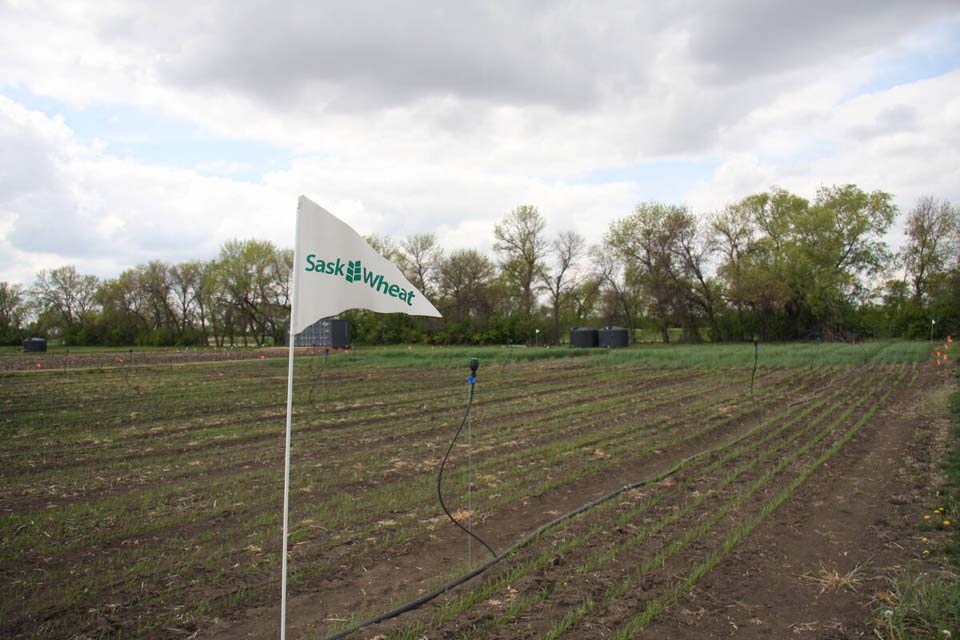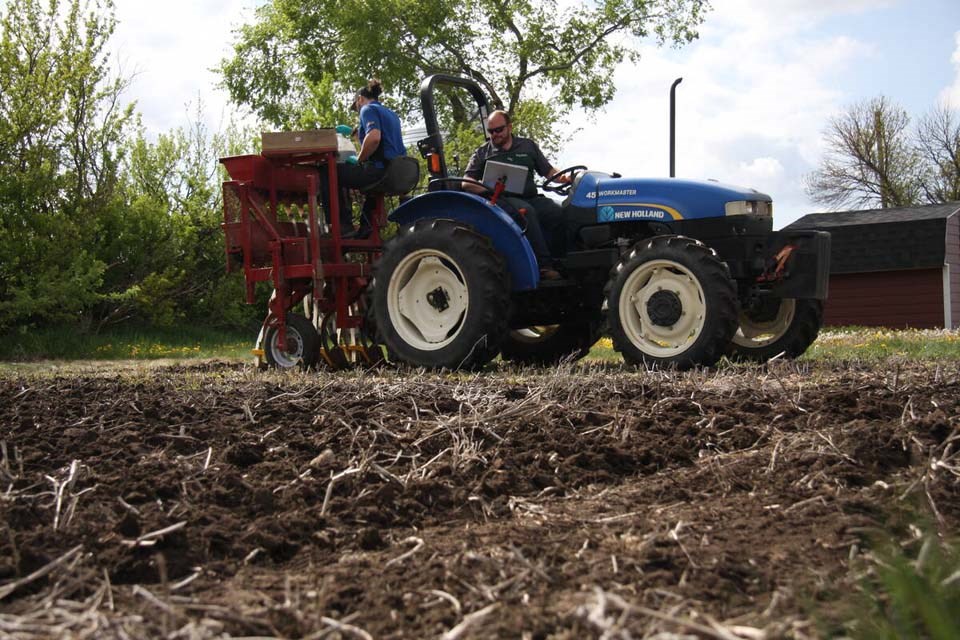LANGHAM — Crop plot seeding was underway May 23 at the Ag in Motion show site near Langham. Some plots had already emerged, but others were waiting for seeding to be completed.
Ag-Quest and Agriculture Canada were on site that windy day, putting things in the ground for the upcoming show.
“We’re planting a mixture of everything,” said Cameron Kayter, a range management biologist for Agriculture Canada who is supervising this year’s crop plot seeding.
“So in this a case, we want to highlight all the different research that we’re doing at Ag Canada in Saskatchewan.”
Agriculture Canada’s plots were cleaned up and ready to go as soon as the ground was dry enough. This year, the plots had some of the best soil mositure in a few years when staff started seeding and they’re taking the best advantage they can.
“We have canola, camelina, we have some poly mixes, like oat-pea, stuff like that,” Kayter said.
“And then we have some forages, obviously, that we keep here perennially. So yeah, it’s kind of a mixed bag. All of our different scientists contribute a plot or two to showcase the research they’re doing.”
They’re planting some diverse crops as well, such as amaranth and fenugrek, alongside the poly mixes of chickpea-flax, lentil-flax, pea-mustard, pea-oat and canola-radish. Their perenial forages are alfalfa-sainfoin-cicer and alfalfa-sainfoin mixes.
 Cameron Kayter and AAFC summer students seed the crop plots at the Ag in Motion site on May 23. | Photo: Janelle Rudolph
Cameron Kayter and AAFC summer students seed the crop plots at the Ag in Motion site on May 23. | Photo: Janelle Rudolph
James White, a research associate and commercial plot specialist for Ag-Quest, has been busy handling the seeding and management of multiple clients’ crop plots at Ag in Motion, including ATP Nutrition, FP Genetics, Gowan Seeds, UPL Ltd., Canterra Seeds, Belchim and Advanced Ag.
For White, the plot work begins as soon as the snow melts. just like on the farm. He ensures soil is tested, plot lengths are calibrated, seed is on its way and fertilizer blends are mixed.
“As soon as the snow is melted, and we can actually walk on site, like as soon as it was dry … I was up here doing soil fertilitiy tests … and then it’s basically, if we have seed on hand and the products, we start treating ASAP.”
This year, the rain wreaked a bit of havoc on White’s plans. In trying to get in the field, he underwent the same struggles as producers: checking the field, pawing the dirt, moving equipment with hopes of seeding only to have to let it sit for a few more days.
Before the rain fell in the middle of May, he was only able to get ATP and FP Genetics plots completed. On May 23, he was back on site, starting with the Gowan plots. For the company, he and his summer student seeded canola, peas, wheat, and flax.
However, the key difference between crop plot seeding at AIM and other typical plots is the hard deadline, making them the priority for White and other exhibitors.
“I mean, that’s kind of my biggest struggle up here,” White said.
“All my clients have been phenomenal to deal with … but you know, they are under the gun, like they’ve got deadlines and stuff. They want to have everything done as soon as they can.”
Sometimes there are delays with companies due to shipping or the need for certain products first. This year, Belchim sent two separate shipments in the mail and the rest delivered by a Belchim sales representative because they’re testing different varieties. Another company, Advanced Ag, was held up by a courier delay.
“It was honestly a bit of a nightmare,” said Greg Goodwin, Advancd Ag’s business development manager.
“I don’t know what happened, but by the skin of our teeth we got it there in time, so I guess that’s all that really matters.”
This year is Advanced Ag’s first time exhibiting at Ag in Motion and its first time doing plots under such circumstances and hiring someone else to manage those plots. All of which added to Goodwin’s stress because the company is typically very hands on with its products and research. He said it is passing off a lot of control, which Advanced Ag isn’t accustomed to doing.
For its plots, it’s seeding CDC Simmie red lentils and AAC Starbuck wheat, and will be running a fertilizer trial to showcase how its products compare to traditional fertilizers. Goodwin described its main product, ACF-SR, as a “tool kit” that does a bit of everything.
The Advanced Ag website says that it’s a biological technology that uses microbes and is “proven to enhance germination, promote plant growth, increase yield, and improve overall soil health.”
Through further research and development for ACF-SR, they’ve developed other products such as SRP, a later season foliar product for plant health, later stage developmen, and improvement of disease resistance, as well as a live seed that’s still in trials.
“So basically, from seed to seedling and to set it up for success, it (the live seed) delivers some hormones, et cetera, early nutrients in the early stages,” Goodwin said.
 SaskWheat crops emerge on plots at the Ag in Motion show site. | Photo by Janelle Rudolph
SaskWheat crops emerge on plots at the Ag in Motion show site. | Photo by Janelle Rudolph
“And then, ACF-SR kind of takes over from there. And then SRP is the one that is foliar.”
Both plots will use a standard fertilizer, but instead of fungicide, one plot will use SRP as the plant health product. The company will compare yield, cost per acre and performance rate.
Of the exhibitors who spoke to the Western Producer, all were excited for the upcoming show, but Advanced Ag more than most.
“We have a pretty significant (product) presence in Saskatchewan…. We sort of entered the market and there’s a lot of people using the product, but not a lot of people that we’ve talked to directly.”
The company runs a small team of seven and often relies on product representatives across Saskatchewan. Goodwin said this will be the first time it will be able to speak with many of its customers in north-central Saskatchewan, despite supplying close to 30 farm operations in the area.
“We haven’t had a chance to meet a lot of Saskatchewan folks, so this is our all in,” he said.
“We’re just jumping into it, and the first time we’ll get to meet a lot of people, and we’re really excited for that.”

